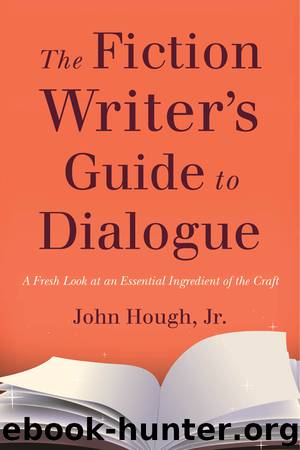The Fiction Writer's Guide to Dialogue by John Hough

Author:John Hough
Language: eng
Format: epub
Publisher: Allworth
Published: 2014-12-31T16:00:00+00:00
Willie Stark is a master psychologist and knows how to manipulate people—how to keep them dangling, how to set them up, startle them, catch them off balance. Notice how slowly he’s speaking here; his dialogue is slow—Warren doesn’t tell us that; the lines read slow—and the artful pause slows time itself to a crawl. It’s a good visual, using the glass of whiskey as a prop, but the pause here is calculated, by both Willie and the author, more to be heard—an interval of silence—than seen. A good gesture, of course, gets you both.
Don’t, however, write gestures that make the dialogue redundant, as happens in real life. Don’t have your character nod and then answer a question in the affirmative. (Nods are easy to write. Be selective; really, you seldom need them.) Your character doesn’t need to raise a hand, palm out, like a traffic cop, when she tells somebody who’s talking too long, “Stop right there.” The gesture is implicit, understood, in the command. If you insist on the gesture, cut the line of dialogue. Your character might raise her arms from her sides, palms up, and shrug, but she can’t also say, “I haven’t the foggiest idea.” One or the other, you choose. I usually go with dialogue.
A shrug can be useful, but only when it supplements the line of dialogue and doesn’t duplicate it. The indifference or resignation of a shrug can usually be captured in dialogue, making the gesture redundant. But a shrug also might make all the difference. A character, say, facing a firing squad, asked if he has any last words, might shrug and say, “Tell my wife I love her.” The shrug colors the declaration with a certain lack of feeling; let’s hope they don’t report it to the wife.
Sighs, like nods and shrugs, are very easy to write—so easy, we sometimes barely notice we’re writing them.
Sighs, like nods and shrugs, are very easy to write—so easy, we sometimes barely notice we’re writing them. In editing first novels I find sighs by the dozen, and few of them, if any, give the dialogue any needed help. A shrug is a better visual than a sigh—it is, in its way, an eloquent gesture. But use both sparingly. Sighs were a staple of the heroines of silent movies, and they can have a whiff of melodrama. Fitzgerald’s characters are dreamers and likely to sigh from time to time, but not Hemingway’s or Faulkner’s less sentimental heroes and heroines. A sigh would come off as saccharine and false amid the terse, edgy dialogue of Didion, McCarthy, or William Kennedy. It’s impossible to imagine Francis Phelan, the shrewd, life-hardened bum, sighing.
Anne Tyler’s characters, on the other hand, are excitable and melodramatic by nature, so of course they sigh. Rebecca Davitch, the middle-aged heroine of Back When We Were Grownups, has invited an old flame, Will Allenby, to dinner. The date is bumping along awkwardly. The phone rings, rings again:
“You certainly get a lot of calls,” Will told her.
Download
This site does not store any files on its server. We only index and link to content provided by other sites. Please contact the content providers to delete copyright contents if any and email us, we'll remove relevant links or contents immediately.
Your Story Matters by Leslie Leyland Fields(1106)
Writing Children's Books For Dummies by Lisa Rojany Buccieri & Peter Economy(984)
Consider This by Chuck Palahniuk(932)
The Spooky Art by Norman Mailer(863)
0990662659 (N) by Beth Revis(861)
The Book Club Cookbook by Judy Gelman & Vicki Levy Krupp(839)
Writing Young Adult Fiction For Dummies by Deborah Halverson(822)
The Kick-Ass Writer: 1001 Ways to Write Great Fiction, Get Published, and Earn Your Audience by Wendig Chuck(737)
The Irresistible Novel by Jeff Gerke(718)
The Naive and the Sentimental Novelist by Orhan Pamuk(713)
Good Prose by Tracy Kidder(687)
The Creative Compass: Writing Your Way from Inspiration to Publication by Millman Dan & Prasada Sierra(677)
Writing from the Senses by Laura Deutsch(651)
Reading Like a Writer: A Guide for People Who Love Books and for Those Who Want to Write Them by FRANCINE PROSE(613)
The Hero Is You by Kendra Levin(588)
On Writing Romance: How to Craft a Novel That Sells by Leigh Michaels(585)
Unless It Moves the Human Heart: The Craft and Art of Writing by Roger Rosenblatt(583)
How to Write a Page-Turner by Jordan Rosenfeld(581)
Just Write by James Scott Bell(563)
